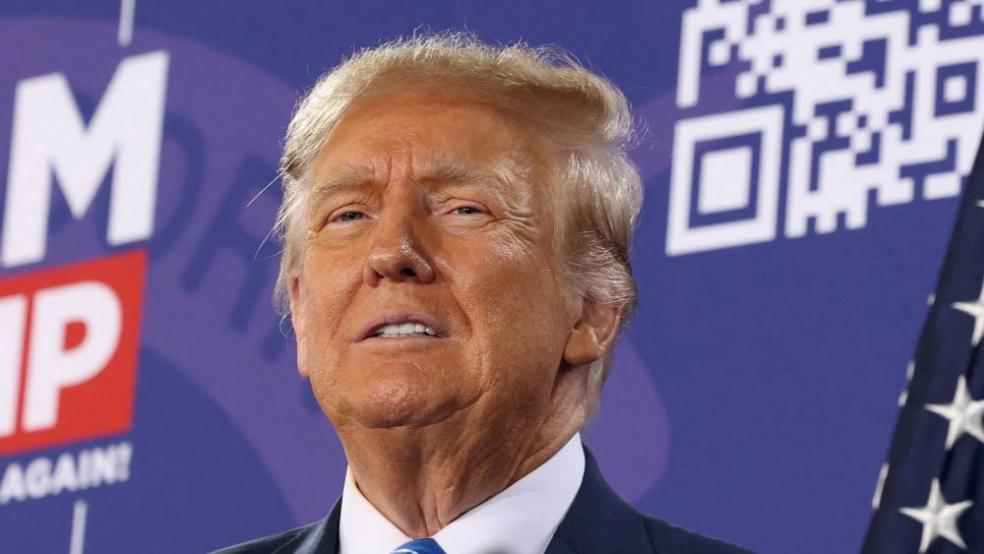One of the key Senate negotiators on a proposal to tighten border security said Sunday that an agreement has been reached, but intensifying opposition from former president Donald Trump and some Republicans could doom any bill.
“We do have a bipartisan deal,” Democratic Sen. Chris Murphy told CNN. “We’re finishing the text right now. This bill could be ready to be on the floor of the United States Senate next week.”
Although the details are not yet fully known, the agreement would reportedly allow the president to close the border when immigration numbers reach certain pre-defined levels, reduce the time involved in deciding asylum requests, and speed up the granting of work permits, among other things. The legislative package would also provide billions in aid to Ukraine, Israel and Taiwan, with Republicans continuing to insist that foreign aid and border security are inextricably linked.
Yet even as he announced the agreement, Murphy acknowledged the growing resistance on the right, led by Trump, the leading Republican presidential candidate. The bill may not reach the Senate floor “if Republicans decide that they want to keep this issue unsettled for political purposes,” Murphy said.
Taking sides: President Joe Biden affirmed his support for the emerging agreement over the weekend, telling supporters in South Carolina that it amounted to “the toughest, smartest, fairest border security bill in history,” one that would authorize 1,300 additional Border Patrol agents, 375 immigration judges and 1,600 asylum officers.
“It would also give me, as President, the emergency authority to shut down the border until it can get back under control,” Biden said. “If that bill were the law today, I’d shut down the border right now and fix it quickly.”
However, Speaker Mike Johnson, who said last week that any compromise bill from the Senate would be “dead on arrival” in the House, continued to pour cold water on the agreement, claiming that the president does not need new legislation to act on the border. The Republican leader has also said he would support border legislation if it includes virtually all of H.R. 2, a hardline GOP border security bill that Democrats say is a non-starter.
“President Biden falsely claimed ... he needs Congress to pass a new law to allow him to close the southern border, but he knows that is untrue,” Johnson said on social media. “As I explained to him in a letter late last year, and have specifically reiterated to him on multiple occasions since, he can and must take executive action immediately to reverse the catastrophe he has created.”
Trump also weighed in, saying on social media that “a bad border deal is far worse than no border deal.” And he accused Democrats of using “this horrific Senate bill” to “put the border disaster onto the shoulders of the Republicans.” Like Johnson, Trump rejected the idea that the president needs any new legislation to “fix” the border.
Playing political football: Trump has seized upon border security in the 2024 presidential race, pushing Republicans to reject any compromise with Democrats on the issue. Noting that some senators were already blaming him for the demise of the negotiated agreement, Trump said he’d be happy to take credit for the failure. “Please blame it on me,” he told supporters in Nevada on Saturday. “Please. Because they were getting ready to pass a very bad bill. And I’ll tell you what, a bad bill — I’d rather have no bill than a bad bill.”
It's not clear who would benefit politically if the compromise agreement falls apart, though Trump and his supporters in Congress appear to think it’s better to keep the issue on the front burner. Jack Pandol, a spokesperson for the National Republican Congressional Committee, told The Washington Post that there are advantages to maintaining the status quo. “Every day Democrats talk about the border is a day they’re losing the argument,” he said.
Still, some insiders think the Republicans will look bad if they reject compromise for political gain. “It puts the Republicans in a really, really bad position if they’re saying, ‘We’re not going to do a deal here because we want to play election-year politics because we think it’s going to help Donald Trump,’” Ian Russell, a former Democratic Congressional Campaign Committee political director, told the Post. “That has the potential to really blow up in their face.”
And some Republican lawmakers are pushing back against Trump’s involvement on the issue. “There are some people that oppose the bill based on the presidential politics issue, rather than the crisis that’s actually occurring at the border,” said Sen. James Lankford of Oklahoma, the lead Republican negotiator.
Murphy said he welcomed Biden’s support of the bill and hoped that the compromise agreement could move forward with bipartisan support. “I’m hopeful that we will still have enough Republicans in the Senate who want to fix the problem at the border rather than just to do Donald Trump’s bidding,” he said, “but we will see over the next 24 to 48 hours whether that’s true.”
The bottom line: A hard-fought border security compromise in the Senate faces what may be an impossibly high hurdle in the House as former president Trump takes the lead in opposing the emerging agreement.
Budget
Trump Aims to Kill Senate Border Security Deal

Reuters



